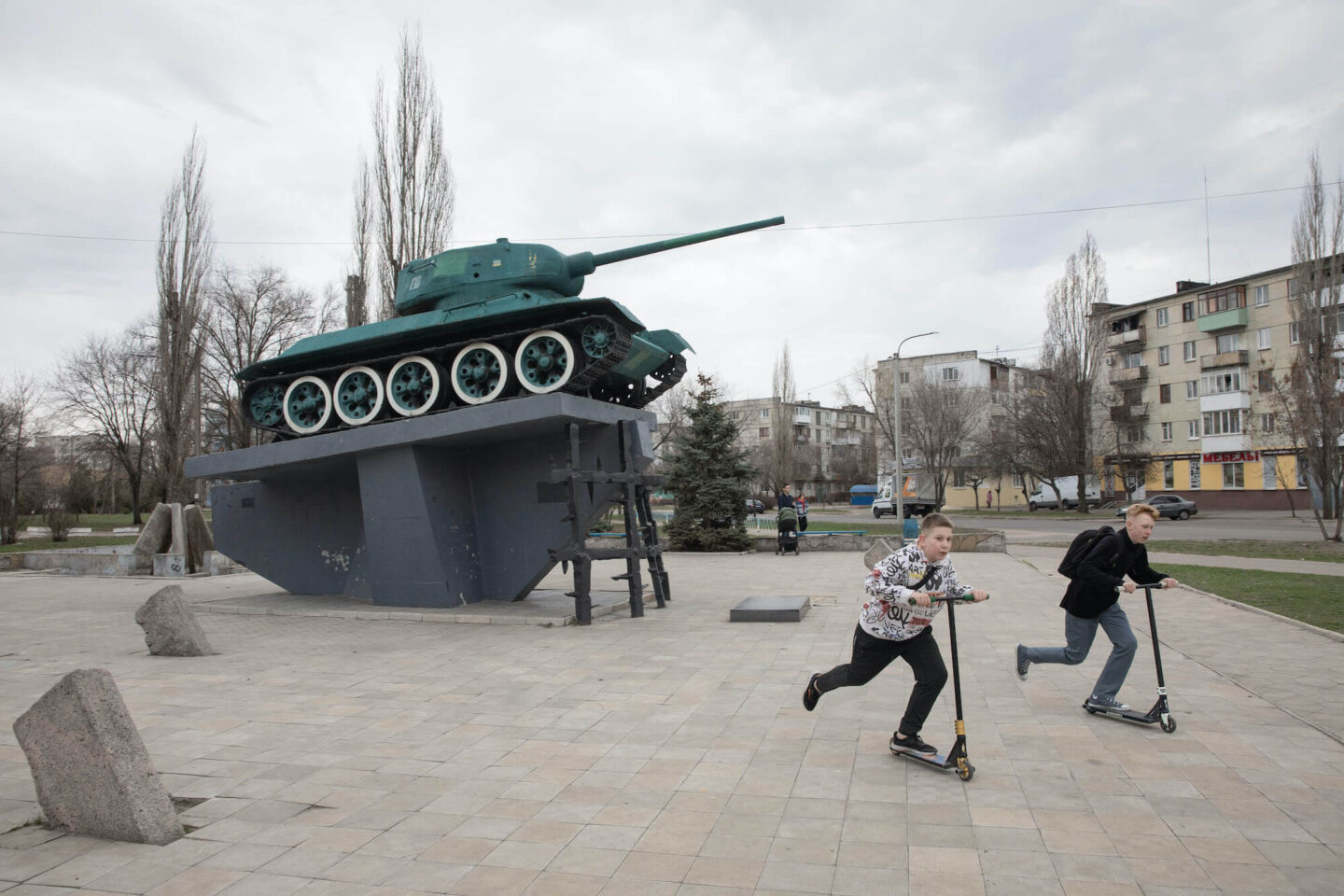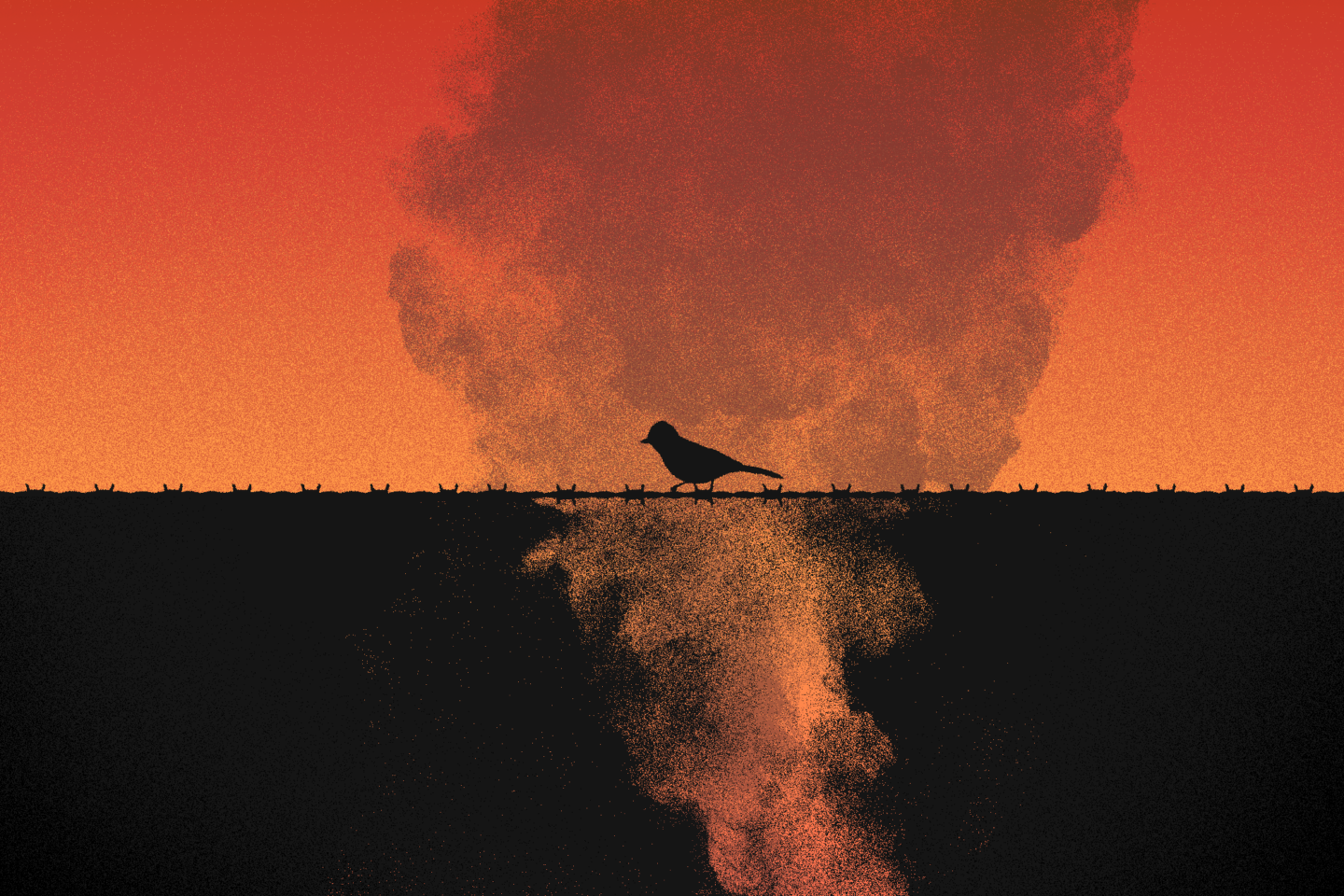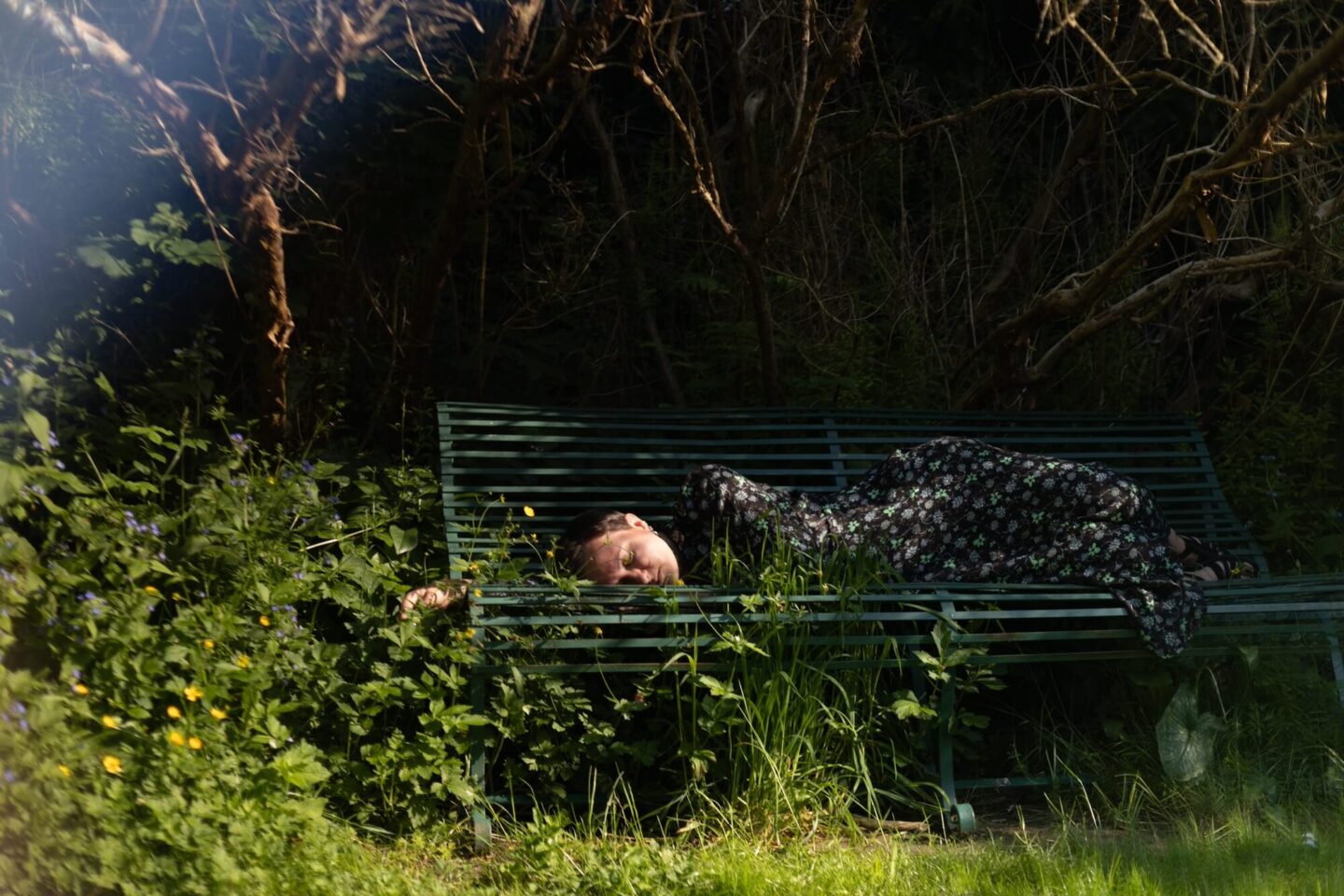We meet with the writer and philosopher Stanislav Aseyev at the Ukrainian Institute of Future to talk about truth as the topic of his speech at Lviv Media Forum.
After our conversation, I show Stanislav the rights catalogs of the Ukrainian Book Institute, the English-language promotional materials that presented the latest literature from Ukraine in 2019 at all the important book fairs. Among other publications, there is Stanislav’s book “In Isolation,” selected by experts. It is a collection of reports that the author wrote from the “DPR” territory since 2015 till 2017, risking his life, until he was captured by militants in the center of Donetsk and was sent to “Isolation” for 962 days, which was a modern concentration camp, located on the territory of the former art space and plant.
This book was not just breathtaking literature, but it was also one of the ways to draw people’s attention to Aseyev and other prisoners of the Kremlin. At that time, the Ukrainian Book Institute team could neither select an excerpt from the book with Stanislav nor agree upon the biography or take a high-quality photo of him, as he was held captive in a concentration camp.
Stanislav Aseyev studied philosophy in Donetsk, then joined the French Foreign Legion, a military association of foreigners in the French army, but stayed there for a short time, returning to Donbas soon, where he began to earn a living doing manual labor while writing literary texts. In 2015, he started to write actively for Radio Liberty, UP, Dzerkalo Tyzhnia, and Ukrayinsky Tyzhden, stayed in the occupied territory to be close to his family, and decided to cover life there, which he did until May 11, 2017.
Stanislav Aseyev was released from captivity on December 29, 2019, together with 75 Ukrainian citizens during a prisoner exchange with the militants. In captivity, Aseyev recorded his experiences and thoughts from the walls of “Isolation” and, after his release, wrote them up in the book “The Torture Camp on Paradise Street.”
At Lviv Media Forum, you gave a lecture entitled The Truth Will Set Us Free. What is truth for you?
It is a citation from the Scripture, which in some translation sounds like “The truth will set you free.” This topic was offered to me by the Lviv Media Forum. Truth is an opinion that corresponds with reality. A person’s choice in favor of one side or the other depends on the truth. In the modern world, there is no solid category of truth. This applies both to historiography in the post-Soviet space and to the presentation of information in general.
Let’s look at the hot topic of Afghanistan: it is covered in a completely different way by Russian and Western media. Russia states that the Taliban are not such bad guys, while the West shows how the Taliban hang their rivals in the street. In this case, the category of truth is of paramount importance. My peers who joined the so-called militia were guided by Russian narratives offered by Russian television in Donbas at the time. For me, these narratives are lies, but it is difficult to argue with them.
The guys who take AK-47s and go to kill Ukrainian soldiers did not appear out of nowhere
I shall bring the example of the shelling of a bus stop in Donetsk, when people were killed and a trolleybus burned down. Every year, militants of the so-called DPR organize a memorial service for the victims of Ukrainian aggression. Even inside the so-called DPR everybody knows the cossacks were responsible for shelling. The Ministry of State Security found and killed those people—participants of these events told me that. So, the truth seems to be abstract, but it is an information product that influences people’s minds and shapes our reality. The guys who take AK-47s and go to kill Ukrainian soldiers did not appear out of nowhere. They are the product of truth they fight for. One of the militants’ slogans is “The truth is with us, God is with us.” So, it is not quite as abstract as it may initially seem, it really influences people’s lives.
Is the truth important to you as a fact and a guideline, or as a situation that can be tested?
Coming back to that Bible citation… The Greek original contains the word alḗtheia, which means specifically the only truth, not just some truth. Meaning the truth is an absolute, a general idea that cannot be doubted or comprehended with ordinary reason. It is an ideal that often coincides with transcendental categories people are fighting for. When they say: “The truth is with us, God is with us,” they, surely, understand the truth as an opinion that coincides with reality, like in logic. It’s more about someone possessing an absolute truth that they are willing to die for. Talking about war, people usually mean the only truth, and not just some truth. As one of our lecturers in Donetsk used to say: “Everyone can have their own truth, but the truth is only one.”

You’ve started to talk about the substitution of concepts that deforms reality. Timothy Snyder explains the Putin regime as the one that substitutes countless facts and notions, which makes people feel like they are in a quicksand. People look for a new foundation, and this is the new reality that is being offered.
Just yesterday, I watched a speech by Russian journalist Alexander Nevzorov. His biography shows the transformation of the category of truth on the example of a human life. He used to be an imperialist who defended the Soviet Union until he went to the Chechen war and saw what was happening to Russian soldiers and how they were dying there, which resulted in him joining the opposite side next to democratic liberals. He said that Russian reality was indeed informationally deformed, but it happened because there was public demand.
People want to pull on the Stalinist cap and listen to Solovyov’s stories on how great they are,—from a wooden latrine. The existence of Putin and his narratives would not be possible without public demand of the Russian people. Putin and the deformation of truth are the consequences of the same Russians. Nevzorov cited the example of bacteria that exist under incredible pressure and temperatures, and the same thing is happening to the Russian people. Looking at the Russian reality, an average Westerner would say it is impossible to live in such conditions.
I think that in an open society, according to Karl Popper, there is no need to shape anything. Everything flows by itself; you visit any event and do not feel there is some general narrative: “This is the only possible way.” In totalitarian and authoritarian regimes, it happens just like that—you are offered the only truth, which you either accept or you go to the cellars.
Therefore, in some societies, does the context affect people in such a way that they do not need the truth?
I can’t say the environment forms an individual unalterably. There were also many dissenters in the Soviet Union. But Brodsky in his essay Less than one writes: no matter how hard you pretend you oppose the system, still in the Union you had to compromise with your conscience to stay alive and continue to exist. You had to either leave the country, go to camps, or compromise. Freedom, like truth, is about being aware of them. Unless people are aware, they are completely tangled in lie and propaganda and cannot see the reality.
I can’t say the environment forms an individual unalterably
I think of the essay by Ihor Pomerantsev The Right to Read, which tells us about the generation of parents who knew about Stalin’s terror but did not pass this knowledge to their children. Children become aware of the regime by themselves and are appalled that their parents haven’t told them the truth. Is this comparable to the current situation?
It is difficult for me to comment about the author’s family at that time, so I will speak about myself. My mom didn’t know at all what I was doing on the occupied territory. She knew neither about my being a journalist and writing for Ukrainian media, nor my Donetsk address. It could be said that I’d hid all that information: I didn’t tell her what I was writing about or that I knew about the arrests. But in that way, I saved her life. When I got arrested and my mom was brought over for interrogation, she said: “My son is not a journalist. Yes, he has disappeared, but what you are talking about does not concern him.” I told my mom I worked in advertising.
Talking about Stalin’s terror—we cannot know what happened there, except that it was something terrible. You can only feel the atmosphere of fear on your own. I don’t think we should harshly judge people who did not talk about something. When I got to Detention Center No. 5, the official prison in Donetsk, I was called to talk to an operational officer. Looking through my documents, he asked: “Where have you been for two years?”
I told him I had spent them in Isolation. Isolation was about two kilometers from the Detention Center, but he asked me: what is Isolation? Is it some colony in Makiyivka? He was genuinely unaware of what had been happening just two kilometers away from him for four years already, by then. And he didn’t know that there was a special isolator concentration camp, even though he worked in this system. That’s why I don’t judge anyone, because you never really know for sure whether people knew of what was taking place.
The history of Ukrainian political prisoners of the USSR feels rather distant, inherited from memories and partly from archives that have survived and are included in the school curriculum. Our current situation is somewhat different—you can write a book “in hot pursuit.” In your opinion, is it easier or harder to tell these stories now?
After my release, I indeed received limitless communication opportunities. I can tell everyone about Isolation, particularly, top European politicians. On the other side, the same is being told from the occupants’ side. When people detained by Ukraine return there, they talk about some nightmares they had allegedly gone through in the Security Service of Ukraine.
It is controversial when, on the one hand, Aseyev talks about Isolation, and on the other hand, there is a dozen of people—average, not public people, who are exposed to the media to talk about Ukraine’s atrocities. When the West meets such controversial information, it becomes very hard to break the wall of Russian propaganda. In the Soviet Union, if you escaped, your voice was heard all around the world. There were few such voices. Now, because information spreads much quicker, everyone can post anything on Facebook. Thus, it is more complicated to convey even such large-scale topics, like Isolation, to Western audience. But it can be hard in Ukraine, too.
In the Soviet Union, if you escaped, your voice was heard all around the world. There were few such voices
When I just got out, fully pro-Ukrainian people would say to me: “That’s impossible something like that could ever happen in Donetsk.” And they should be convinced. I don’t have videotapes with tortures, I refer to testimonies of those forty victims who were interrogated by the UN and who told the same things that I did. This is the only evidence. Therefore, on the one hand, it is now easier, but on the other hand—the information is distorted, so you need to put more efforts and use your reputation so that people believed you.
In This Is Not Propaganda, Peter Pomerantsev says that it is inefficient to fight fake news, and a healthy information space should rather be built. What is constructive propaganda for you, as opposed to fakes from the opposite side?
In the information sphere, there is an unspoken law that the force of opposition only strengthens the effect. If you react to fakes, you will drown in comments. I mostly ignore any information about me that appears on the opposite side. As soon as I got out, the FSB got involved to discredit me and the information I disseminate. But the thing with these fakes is that no one will remember about them in a day or two.
Look how the information flows now! At first there was Navalny, then Protasevych got arrested, now Afghanistan. Who remembers about Navalny after Protasevych’s arrest? We’ve been talking solely about Protasevych for a few weeks, but now he is forgotten, too. And these are the world top news. When you speak about some Isolation and some “DPR-LPR”, the attention span lasts for several hours. In case of fakes, I try to keep the silent mode and advise my colleagues to do the same. I advise them not to make any reposts, not to mock anything, because this is a tangle of such size that we are simply unable to unwind.
We don’t talk much about the content of The Torture Camp on Paradise Street in terms of the stories you described there, but please tell me about the book as a means of conveying information. What are the challenges of working with such topic?
I will be honest with you; I hate the topic of Isolation because it ruins my life and it does so much tougher than in captivity. In captivity, you stay in so critical situation that your body and psyche mobilize and resist this situation. In freedom, reality becomes softer, and you are more vulnerable to stress when you recollect everything. And I’ve been recollecting almost daily for about eighteen months: the same experience in nearly the same words.
I constantly tell dozens and hundreds of people the same thing. It drains me out, I have sleeping and health issues due to stress I went through after my release. I am actively thinking of switching from the topic of war in Donbas and Isolation to other topics, particularly the environment that bothers me. I don’t want my life to be associated exclusively with that.
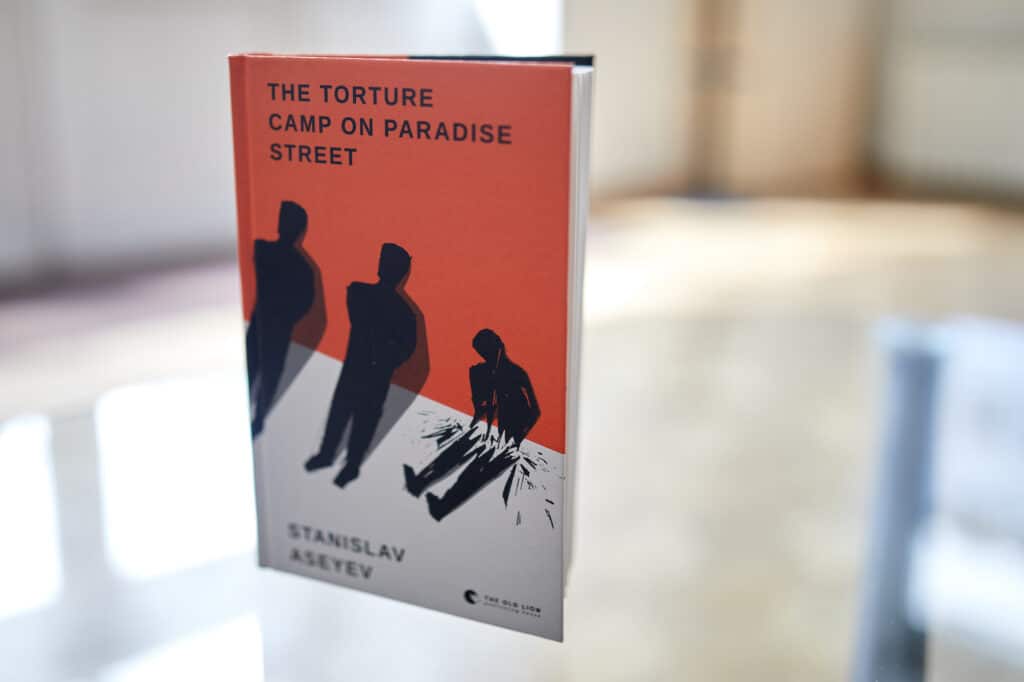
What do you think about simplified presentation of hard topics? You repeat the same stories over and over again, but for different audience, so, obviously, you look for different wording for each of them. Doesn’t it turn the real history of tragedy in your consciousness into another horror story that needs to be told again and again?
Over these eighteen months of stories, Isolation indeed has started to turn to Coca-Cola advertisement to some extent, at least in Ukraine. This is an advertising poster that you can understand. Isolation appeared in 2014, but it only started to attract people’s attention after I was released from captivity and managed to bring people around to this topic. I wrote a book, others made documentaries. Isolation has become a catch-all word; on Facebook, I sometimes see comments about how good Russia is being replied to with a suggestion to go to Isolation.
On the one side, this is very good, but on the other, people are getting used to the topic. It is hard to fight, as in Ukraine you can barely do anything with well-what-can-you-do reaction. But in the West, I feel that I have not even begun to work with this topic. I spoke in Strasbourg, in PACE, met with the OSCE chairman, politicians… this is just a drop in the bucket. Most of Westerners have no idea that a concentration camp exists in our time.
The Torture Camp is now being translated into other languages: German, French, an English translation has been published, but I realize that at least two or three years are needed to break into the Western market and tell the same story again, but to Western readers.
What can be an entrance point for the topic of national tragedy? For example, there are books about the Holocaust—even if they are popular and simplified, they can lead the reader to more complex lectures. We can say the same about movies on these topics.
I’d agree on a simplified option. If my book were to be made into a feature film in any format, even with elements of fiction and a fictional plot, it would be a very good steppingstone to read the book and understand what really happened in Isolation. A book is read by a few, while a movie can be seen by millions under the most favorable circumstances. A movie would take a lot of work off my chest.
How to adapt the experience of Isolation into the collective experience of Ukrainian society? Is it possible?
In my book, I write about “psychological separatism.” In Isolation, I used this term to describe a mental state in which I was indifferent to other people’s sufferings in the concentration camp. I realized that I would either go insane if I let it pass through me, or I would look at everything as an outsider. Yes, every day somebody was tortured, amd people with broken bones were brought to the cells—but at that point, I’d already seen that for eighteen months, that was nothing out of the ordinary for me. My psyche ceased to empathize with these people.
I think that is approximately what is now happening with our country on a national scale. The war has been going on since 2014, every day someone is tortured or killed. It is impossible and unnecessary to make the war our personal experience every day. It will ruin your health the same way Isolation ruined mine. But from an individual perspective, you should understand it is your story. Even if today, you go to a movie or go to a restaurant with your wife, you still remember the things that go on in Crimea and in Donbas are related to you, and you will engage in this topic if there is need.
But you shouldn’t mix your life with that just because you cannot do anything about it practically and immediately. In eighteen months, I haven’t done everything planned, despite my speaking about Isolation every day. It may seem that everyone on all political levels already knows about it, the UN published information on Isolation as a separate chapter in their reports, although previously it was but a paragraph… But Isolation still exists—we’ve not reached our aim yet.
Can this traumatic experience we mention here become shared for Ukrainian society? I mean for society to define it as theirs.
I don’t think suffering may be an idea that unites a nation. Although, in case with the Jews, perhaps, this is exactly what is happening, as their suffering has been occupying the first place in their national memory since the pre-Christian times and up until World War II. But it is a unique case, and I wouldn’t like Ukraine to share this scenario. However, we won’t be able to forget what is on the background.
Thus, entertaining content always wins, but even news reports remind us that there is a war going on. You are reminded of that even when you see soldiers on the streets, who were not there previously. We won’t ever forget about Donbas, but I wouldn’t want it to become the all-nation traumatic experience.
We won’t ever forget about Donbas, but I wouldn’t want it to become the all-nation traumatic experience
Then, what is our unifying experience?
I have recently been to European countries that had a socialist or even Soviet past. Their national idea is built upon opposing themselves to the Russian Federation and the Soviet Union. Everything connected to Russia, the Russian language, or its modern culture, is seen through the prism of the Soviet past and the things the Communists did. Now, I see something similar in Ukraine.
If we see our national idea as an opposition to the modern Russian Federation—it may be just for what is generally going on with our history now. It is not quite good, as this narrative is, in fact, negative. But this idea is a self-preservation instinct that will dictate narratives to the next generation, which will already remember what Russia is and what it has done to us. So, when the war and the occupation are over, we will be able to come to something positive.
Do you see any contemporary books that talk about our current experiences?
I hate it when politics is mixed into literature. When we take my book The Torture Camp and draw the analogy to, let’s say, Soviet books on concentration camps—none of those is about politics. True literature always has ontology and metaphysics in its centre. It is always about what a human being is, what we can do in relation to another human being, what the sense of our existence is.
Surely, there is a rational narrative—it is a political regime that puts you in the concentration camp. But the text itself talks about a human being and his philosophy. That’s why Russian classical literature is so popular; it encodes the metaphysical concepts that I studied at the Faculty of Philosophy. Only, at the faculty, we must read texts that are hard to understand, while literature presents those concepts in a literary form. I hope our literature will also have a human being in its centre, who will ask: “What is the meaning of my life? What should I be guided by when making a choice?” These questions have not changed for thousands of years.
Do you see a lot of texts with an obvious political inclination in modern Ukrainian literature?
No, I’ve not really been speaking about it, as I don’t read much of it, although it may sound incorrect. I read Zhadan’s Voroshylovgrad for the first time in the colony, because I never got around to it. I’m talking more about contemporary Russian literature, authors who write about the war, but the Russian Federation and ideology, Volodymyr Putin, “The truth is with us, God is with us” are in the first place.
Why do you think a good author can choose the propagandistic side of art?
That’s the question I am asking myself in relation to Nilita Mikhalkov. How can the person who made Burnt by the Sun now do completely opposite things to what he himself showed? I mean the story about the 1930s: is he really unaware of the fact that the system he is now praising is almost the same as then? I can’t say these are insincere people working for money. These are frank people who at some point believed in this new truth. They are talented, but their talent serves the opposite side.
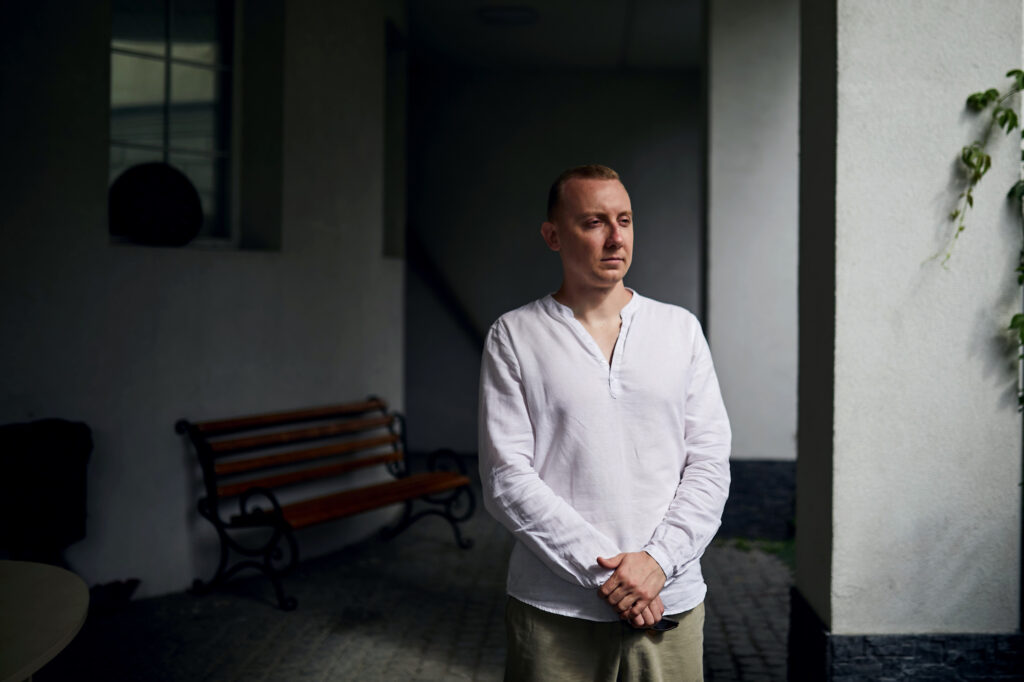
In the context of Isolation, you speak about losing any sentiment towards Russian culture. How did it happen?
The revision of my worldview took place in practice with the outbreak of the war and with Isolation. Trying to convince someone theoretically is entirely different to seeing with your own eyes that the “Russian world” is and how the Russians understand it. That’s why I feel skeptical toward the all-nation propaganda even in its good sense, because I realize that people my age or older already have a certain position that cannot be turned off or switched to another channel. I, for one, don’t watch Russian channels now, even though I can do it via the internet.
The same is happening on the occupied territory: even if those people can watch 1+1 or Novy channels, they won’t do it, as their reality is formed in a particular way, and it can only change by drastic life experience like captivity, a cellar or torture. Specifically, if these are “your folks” that do this to you. When it happens to people like me, it only reinforces what people of the “Russian world” believe. But when these were “their folks” that ended up in cellars, their worldview changed not because of a conversation with me, but because of what yesterday’s comrades did to them in the basement.
How can Ukrainians have this sentiment for Russian?
In my essay Named after Lenin, I describe my mom’s story. In her case, these sentiments were not caused by her love toward the Soviet Union, but by her memories about her past, related to her parents and Donetsk. And yes, that Donetsk included Lenin monuments and Communist flags. Still, every one of my mom’s stories finished with something deeply personal like her going to the May Day demonstration with her father, whom my mom lost at the age of ten. Listening to her from year to year, I saw what she missed was not the sausage for 2.20, but her childhood in Donetsk, that turned into nobody knows what.
It is longing for something lost, but the problem is that these people do not see the difference, and in its collective manifestation, this translates into Soviet flags and the protection of Lenin monuments. In a group, it becomes a political issue, and individually, it is a psychological problem, in which people are hardly ideological supporters of communism.
People may think we take their history from them when we say that communism and the USSR are bad things. Sometimes it reaches some absurd level when they claim that the Union saved Ukrainian culture, because it existed in it.
According to this logic, I should thank the Ministry of State Security for my book, as without Isolation, cellars and tortures I wouldn’t have written it. By the way, the MSS tried to impose this perverted logic on me. When I was in captivity, they brought me in for interrogation and cited the example of Kozlovsky, who was already free at the time. They told me: “See, we’ve made your Kozlovsky famous around the world, and all this because we’ve held him here for two years.” They didn’t even smile when they were telling me this.
In The Torture Camp you also write about faith: at some point, you realize you have to rely on something, to believe in something. What do you believe in now?
Now I am artificially pushing myself in this sense. I am no longer in a critical situation, when you really need to know what direction to take: to leave this world or to stay. And if you stay, then why? In everyday life, there is less space for contemplation. Because of Isolation and my psychological problems, I know our life should be artificially filled with senses that will prevent us from committing suicide after release. After what we’ve been through in captivity, it is absurd to reverse our choice in favor of death.
n everyday life, there is less space for contemplation
That’s why I fill my life with somewhat absurd things. Like, I have this idea to run from Kyiv to Lisbon. There is no “what for” here, nobody forces me to do this. I must spend a couple of years preparing for it. I can’t say that my life is guided by a single solid idea that I could lean on.
How do you identify yourself now?
My life is now merging with Isolation. To some extent, it even forms my identity: a desire for revenge on those people. I have been living by these principles for a year and a half. My revenge flows into my books, interviews and informational influence that I possess in the absence of physical access. It already works as when we’ve published information about the Russian citizenship of the three key criminals from Isolation, one of them disappeared, and the two others were moved from administration to the kitchen. These are small problems that we managed to create because we pushed this information to the media.
You write that freedom, like love, must be learned. Should we learn the truth?
In Plato’s Dialogues there is a bright image. Prisoners stand against the wall, a fire is burning nearby, and some people are walking by. The prisoners can only see people’s shadows. Then they turn to the light, see the real appearance of people, the light hits their eyes, and it becomes uncomfortable to look. Some of the prisoners turn back against the wall, because it is more comfortable to watch the shadows. It is applicable to truth, as it is always uncomfortable and brings negative feelings to those who see it for the first time.
And I was talking about freedom quite literally. I’ve still not got used to freedom and keep learning it every day.
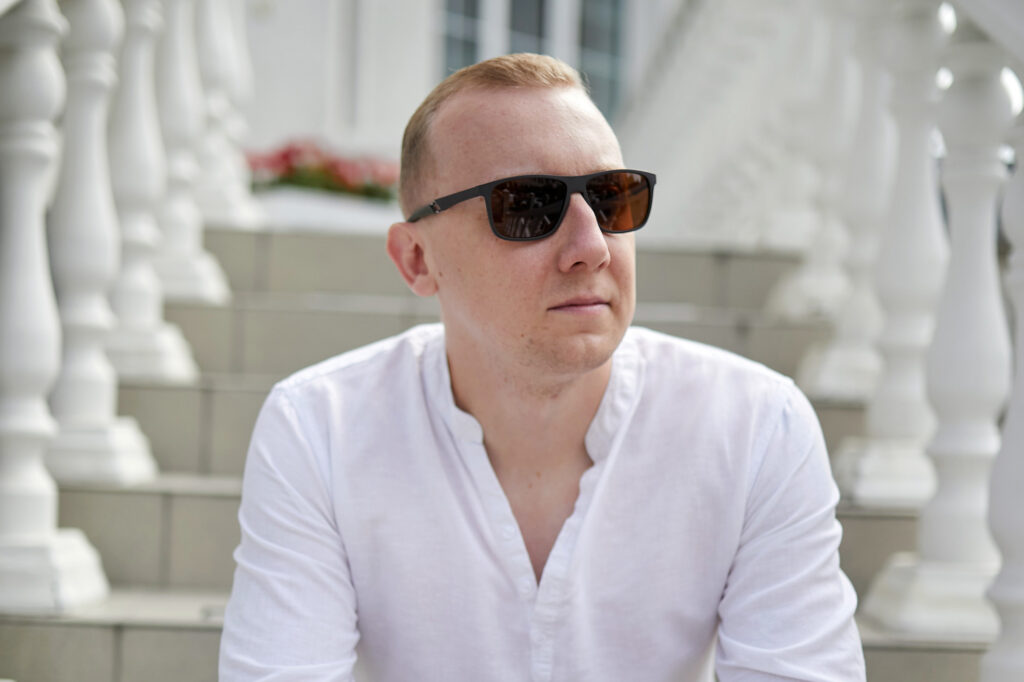
Have the Ukrainians learnt freedom?
If you understand freedom in the context of Western culture, then mostly we are not ready to such freedom. Ukraine, despite thirty years of its independence and 7 years of war [the interview was recorded on September 17, 2021, five months before the full-scale invasion — Ed.], mentally is a deeply Soviet country. We are conservative, but there are conservative countries in the EU, too. We have many Soviet narratives, predominantly in our treatment of money and wealth. It results in corruption and disrespect for the individual. In Europe, your reputation is based on your wealth. I think we need at least one more generation for changes.
You’ve mentioned other topics, apart from Isolation, that you are interested in. Please tell us about them.
It is the environment, the only topic that I consider the least political and least discussed in our country.
Translation — Olha Dubnevych
§§§
[The translation of this publication was compiled with the support of the European Union and the International Renaissance Foundation within the framework “European Renaissance of Ukraine” project. Its content is the exclusive responsibility of the authors and does not necessarily reflect the views of the European Union and the International Renaissance Foundation]


